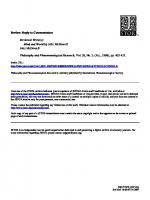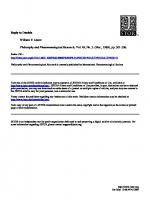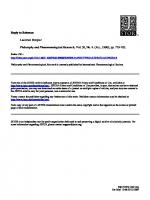
- Author / Uploaded
- Dretske Fred
Reply to Niiniluoto
Fred I. Dretske Philosophy of Science, Vol. 45, No. 3. (Sep., 1978), pp. 440-444. Stable URL: http://links.jstor.org/si
1,437 9 105KB
Pages 6 Page size 595 x 792 pts Year 2007
Recommend Papers
File loading please wait...
Citation preview
Reply to Niiniluoto Fred I. Dretske Philosophy of Science, Vol. 45, No. 3. (Sep., 1978), pp. 440-444. Stable URL: http://links.jstor.org/sici?sici=0031-8248%28197809%2945%3A3%3C440%3ARTN%3E2.0.CO%3B2-X Philosophy of Science is currently published by The University of Chicago Press.
Your use of the JSTOR archive indicates your acceptance of JSTOR's Terms and Conditions of Use, available at http://www.jstor.org/about/terms.html. JSTOR's Terms and Conditions of Use provides, in part, that unless you have obtained prior permission, you may not download an entire issue of a journal or multiple copies of articles, and you may use content in the JSTOR archive only for your personal, non-commercial use. Please contact the publisher regarding any further use of this work. Publisher contact information may be obtained at http://www.jstor.org/journals/ucpress.html. Each copy of any part of a JSTOR transmission must contain the same copyright notice that appears on the screen or printed page of such transmission.
JSTOR is an independent not-for-profit organization dedicated to and preserving a digital archive of scholarly journals. For more information regarding JSTOR, please contact [email protected].
http://www.jstor.org Fri May 18 08:39:08 2007
DISCUSSION
REPLY TO NIINILUOTO*
FRED I. DRETSKE University of Wisconsin
In "Laws of Nature" [l] I argued that natural laws are not universal truths. Laws have properties that enable them to function in a special way. Since universal truths do not have these properties, they cannot be promoted to the status of laws by assigning them this function, by using them in the way laws are typically used. To suppose that we could effect this transformation by the way we used a generalization is like supposing that we could make thumb tacks into garden hoses by using them to water flowers. It will not work. Thumb tacks lack the requisite structure. Hence, they cannot be used in the way garden hoses are normally used. And universal truths lack the properties that would enable them to function, and thereby qualify, as laws of nature. Some philosophers have nonetheless convinced themselves that universal truths of the form "(x) (Fx 2 Gx)" can be made to function as laws. If we succeed in using them as laws, if they can be made to function as laws, then for all practical (not to mention philosophical) purposes they are laws. Some universal generalizations are confirmed (both directly and indirectly) by a mass of experimental evidence. They have been integrated into a network of accepted scientific principles. They (therefore) help to explain the phenomena that figure in their confirmation, they serve as useful tools in prediction, and (in virtue of this accumulated authority) they support various posits about what would, or would not, happen if certain (counter-to-fact) circumstances were realized. To some philosophers this is self-evident. To deny it is tantamount to denying that there are laws of nature. What is self-evident, of course, is that something functions in this way. What is not self-evident is that they are universal generalizations. I do not doubt that something is used to water lawns and flowers, but this does not commit me to the existence of water transporting thumb tacks. Niiniluoto [2] tells us that the universal generalizations that function *Received March, 1978. Philosophy of Science, 45 (1978) pp. 440-444.
Copyright O 1978 by the Philosophy of Science Association
REPLY TO NIINILUOTO
44 1
in this special way are nomically necessary (43 1,436) or lawlike (43 1, 436) generalizations. This is a revealing, if not particularly illuminating, admission. For it suggests that it is neither universality nor truth (nor their combination) that is responsible for the remarkable power of (certain) universal generalizations. Rather, it is their modal quality, the fact that they are nomically or physically necessary, that deserves the credit. Not just any universal truth qualifies as a law. Only some generalizations can be confirmed by their instances. Only some can be made to function satisfactorily in explanations. Only some support counterfactual conditionals and have the peculiar intensional structure I described. The ones that do are the ones that are nomically necessary. This, according to Niiniluoto, is the standard view of natural laws-the view over which analytical philosophers have labored so mightily for so many years. I am accused of attacking this venerable tradition and chided for failing to appreciate (or understand) its real strengths. But what is the standard view? Niiniluoto suggests two possible interpretations (432). Is it that: (A) Universal generalizations acquire their modal character (the property of being physically necessary) by being used in a special way? Or is it, rather, that: (B) Certain universal generalizations are used in a special way because they are physically necessary (lawlike)? The first view is the one that I labeled functionalism. It traces the modal authority of natural laws to us. Physical necessity is something that certain (otherwise eligible) generalizations acquire as a result of our epistemic, predictive, explanatory, and systematic use of them. The second view reverses this picture by attributing to natural laws a power (nomic or physical necessity) that (presumably) explains how and why they can be used in this special way. It is, of course, the first view that I was attacking in my paper. Niiniluoto claims that I am rejecting both (A) and ( B ) , and, in a sense, I am. But for quite different reasons. I shall return to (B) in a moment. First some remarks about (A). As far as I can see Niiniluoto agrees with me that the functionalistic version of the standard view (i.e., (A)) is unsatisfactory. He sometimes says things that suggest the contrary: e.g., that it is a generalization's integration into a larger and deeper theoretical framework (the systemicity factor) that transforms a generalization into a law (434). But he realizes (432) that this is unilluminating unless we have an antecedent
442
FRED I. DRETSKE
account (i.e., an account that is independent of the notion of lawlikeness) of theoretical frameworks. But aside from this brief flirtation with functionalism, Niiniluoto seems to endorse version (B) of the standard view and, more significantly, he does so because he agrees with my criticisms of (A). He agrees, for example, that we cannot simply make universal generalizations serve in explanations. Rather, the things we use in explanations must already have the property of being physically necessary in order to function in an explanatory way (436). He agrees, moreover, that instantial confirmation of universal generalizations requires that the generalizations in question either be nomically necessary (lawlike) or be appropriately related to other lawlike generalizations, theories or frameworks (434). This is exactly what I argued. The assumption of lawlikeness is required somewhere in the proceedings in order to make the instances of a generalization relevant to one another and, thus, to allow genuine confirmation (observed instances affecting the probability of unobserved instances) to occur. Furthermore, Niiniluoto agrees that laws have a counterfactual force, but he explains this by appealing to the nomic necessity of those generalizations that qualify as laws (437). And he explains the peculiar opacity of natural laws by, once again, reminding us that the generalizations in question are physically necessary (438). With enemies like this I do not need friends. The only reason I can see for why Niiniluoto thinks he disagrees with me is because he thinks he has an alternative account of natural laws, one that avoids the ontological excesses of my own view. This alternative account is simply the second version of the standard view-the one expressed as (B) above. Niiniluoto appears to think that this constitutes a genuine theory and, hence, a theory with which my own is in competition. This, though is an illusion. (B) offers a convenient name for a mystery ("physical necessity") but certainly no explanation of the mystery. This version of the standard theory invents a special power, attributes this power to certain generalizations, and then appeals to this mysterious power to "explain" why these generalizations are unique (laws). Laws are different than accidentally true generalizations because, you see, laws are universal generalizations that are necessarily true. Laws support counterfactual conditionals (while other universal truths do not) because, you see, laws are those generalizations that are true in all (physically) possible universes. Laws can be used in explanations (while other universal truths cannot) because, you see, laws are those universal truths that describe nomic regularities and (quite happily) nomic regularities are just the ones that have explanatory efficacy.
REPLY TO NIINILUOTO
443
To suppose that one has an analysis, or theory, of natural laws in the idea that laws are nomically necessary generalizations is like supposing that one has a moral theory in the idea that moral judgments are judgments having a (morally) normative character. All this way of talking provides is a way of talking. It explains nothing. We can, if we like, use a special symbolic device (an operator for "physical necessity" or for "obligatory") to give ourselves a more convenient way of expressing natural laws and statements about our obligations. This might even be a useful device for purposes of formalizing a body of discourse. But no one (I assume) thinks that these representational devices constitute a theory or analysis of what we are talking about when we use these symbols to say something. I have no objection to talking about laws as statements that are true in all (physically) possible worlds. Neither do I have any objection to talking about moral principles as those statements that are true in all (morally) ideal worlds. I just have a low opinion of the philosophical advantages to be gained by this way of talking. And I have the same low opinion of the advantages to be gained by talking, not of universal properties, but of functions from possible worlds to extensions. If Niiniluoto insists that I talk this way, I will. The problem gets expressed differently, but these linguistic cartwheels bring us no closer to a solution. In "Laws of Nature" I tried to provide an account or analysis of natural laws that helped in understanding the peculiar necessity associated with them. The analysis identified laws with singular statements of fact (contingent) describing the relationship between universal properties and magnitudes. It was argued that if laws are conceived in this way, then we could give an explanation, a genuine explanation, of why laws are able to function in the way they do. The constellation of properties that makes laws unique are a manifestation of ontological ascent. If laws are relationships between universals, if our statements of law are (whether overtly or covertly) descriptions of these interconnections between universals, then one is in a position to see why laws support counterfactuals, why laws can figure in the explanation of their instances, why laws can be confirmed by their instances (why the instances of a law are relevant to one another in the way required by genuine confirmation), and why our statements of law exhibit a peculiar opacity. Whatever the merits of this analysis, and the alleged explanations it provides, it cannot be criticized on the grounds that the standard analysis provides a better, or more economical, account. For the only attempt at an analysis is version (A) of the standard treatment and this, as I argued, is hopelessly inadequate. Version (B) of the
444
FRED I. DRETSKE
standard doctrine does not even enter the competition. It is merely an expression of the problem. It is, moreover, a misleading expression of the problem because it implies that the property of being physically necessary is a property that belongs to universal generalizations. This only succeeds in multiplying mysteries. We are not only kept in the dark about what "physical necessity" might be, but we are also left puzzling over how universal generalizations (given their acknowledged limitations) could acquire this remarkable power. Version (B) of the standard analysis contributes to the problem by mislocating the bearer of its unanalyzed power. In this respect version (B) is not a solution; its part of the problem. REFERENCES
[ l ] Dretske, Fred. "Laws of Nature." Philosophy of Science 44 (1977): 248-268. [2] Niiniluoto, I. "Dretske on Laws of Nature." Philosophy of Science 45 (1978): 43 1-439.









